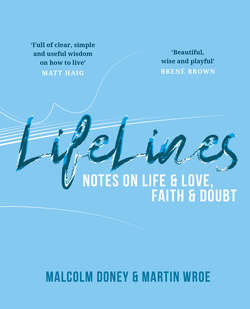Читать книгу LifeLines - Malcolm Doney - Страница 18
На сайте Литреса книга снята с продажи.
Оглавление9
Stay Friends
Most of us have items of clothing that are old trusted friends. A thin T-shirt, washed soft and comfy; faded jeans that have shaped themselves to the contours of our body. They’re part of the fabric of our existence.
Old friends share some of the same characteristics of old clothes. In the best sense, they’re easy. Shared experiences and deep understanding means that an enormous amount can go unsaid. We settle into one another’s company like an old armchair. One phrase, or the mention of someone’s name, can set us off into uncontrolled laughter.
The poet Alden Nowlan1 plumbs the depths of this kind of friendship in ‘Great Things Have Happened’:
We were talking about the great things that have happened in our lifetimes; and I said, ‘Oh, I suppose the moon landing was the greatest thing that has happened in my time.’ But, of course, we were all lying. The truth is the moon landing didn’t mean one-tenth as much to me as one night in 1963 when we lived in a three-room flat...
... That night, the three of us, Claudine, Johnnie and me,
woke up at half-past four in the morning and ate cinnamon toast together...
... it was like the feeling
you get sometimes in a country you’ve never visited
before, when the bread doesn’t taste quite the same,
the butter is a small adventure, and they put paprika on the table instead of pepper, except that there was nobody in this country except the three of us, half-tipsy with the wonder
of being alive, and wholly enveloped in love.
Close companionship fosters intimacy. And shared intimacy gives us permission to be honest with one another. It allows us both to support and challenge one another, because we’re working from a position of mutual trust. There is no guile, no agenda. As the Hebrew proverb goes: ‘Wounds from a friend can be trusted, while an enemy multiplies kisses.’
We need our friends like we need oxygen. The older our friendship, the more we need to acknowledge it, and them – especially when the shadows lengthen. Because that’s when we need company. There’s a verse that is said to come from the novelist Albert Camus or from a Jewish folk song; either way it rings true:
Don’t walk in front of me; I may not follow. Don’t walk behind me; I may not lead. Just walk beside me and be my friend.2
Helen Keller, the deaf-blind author and activist knew the value of this, saying, ‘I would rather walk with a friend in the dark, than alone in the light.’3 So did A. A. Milne’s Piglet, in The House at Pooh Corner:4
Piglet sidled up to Pooh from behind.
‘Pooh!’ he whispered.
‘Yes, Piglet?’
‘Nothing,’ said Piglet, taking Pooh’s paw. ‘I just wanted to be sure of you.’
